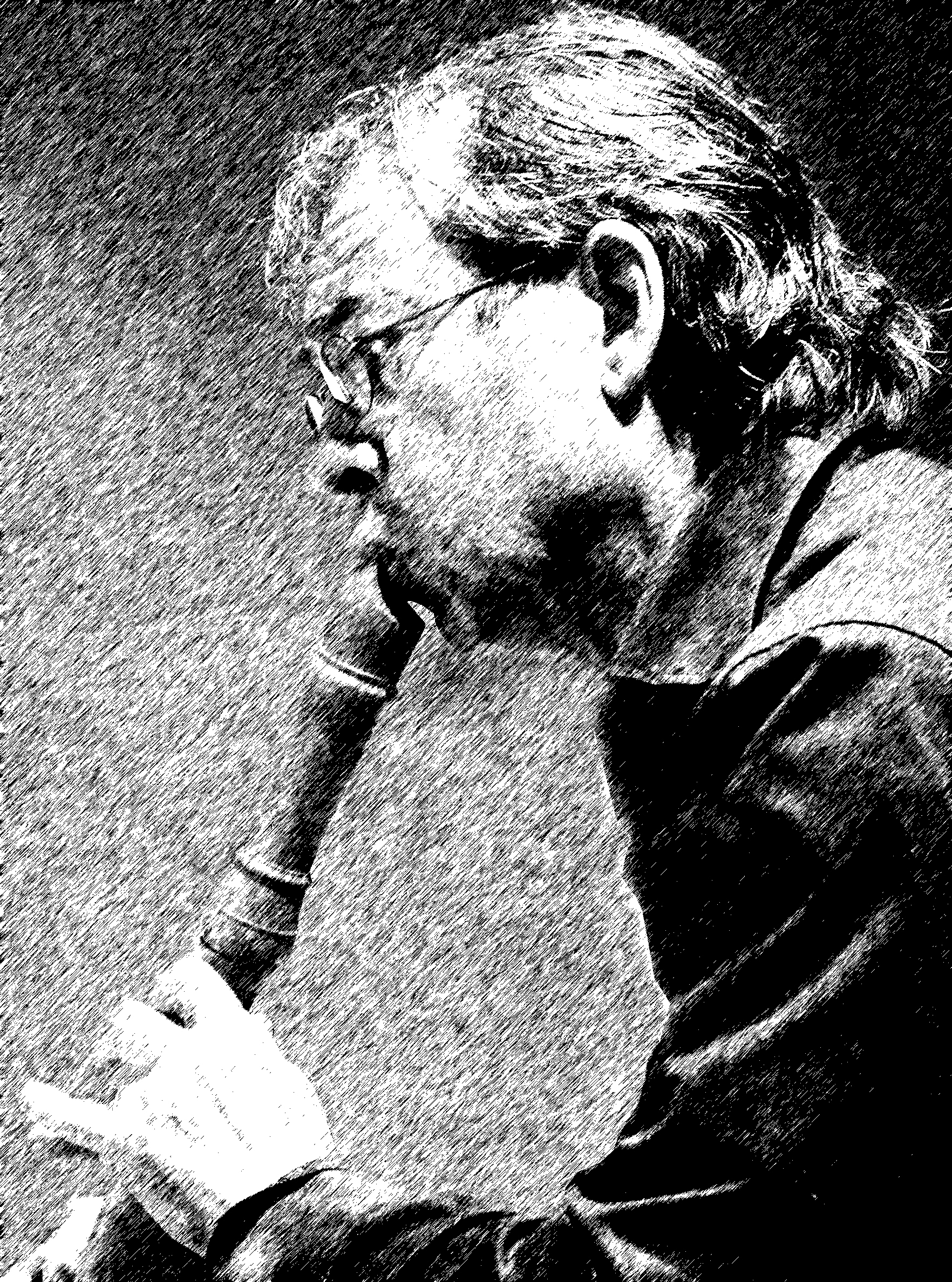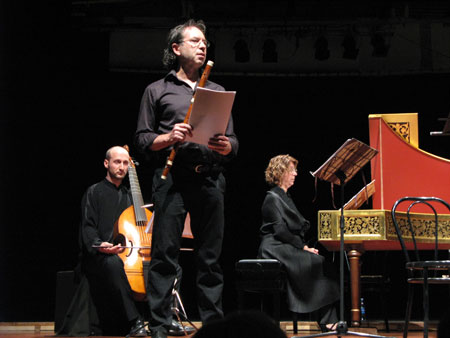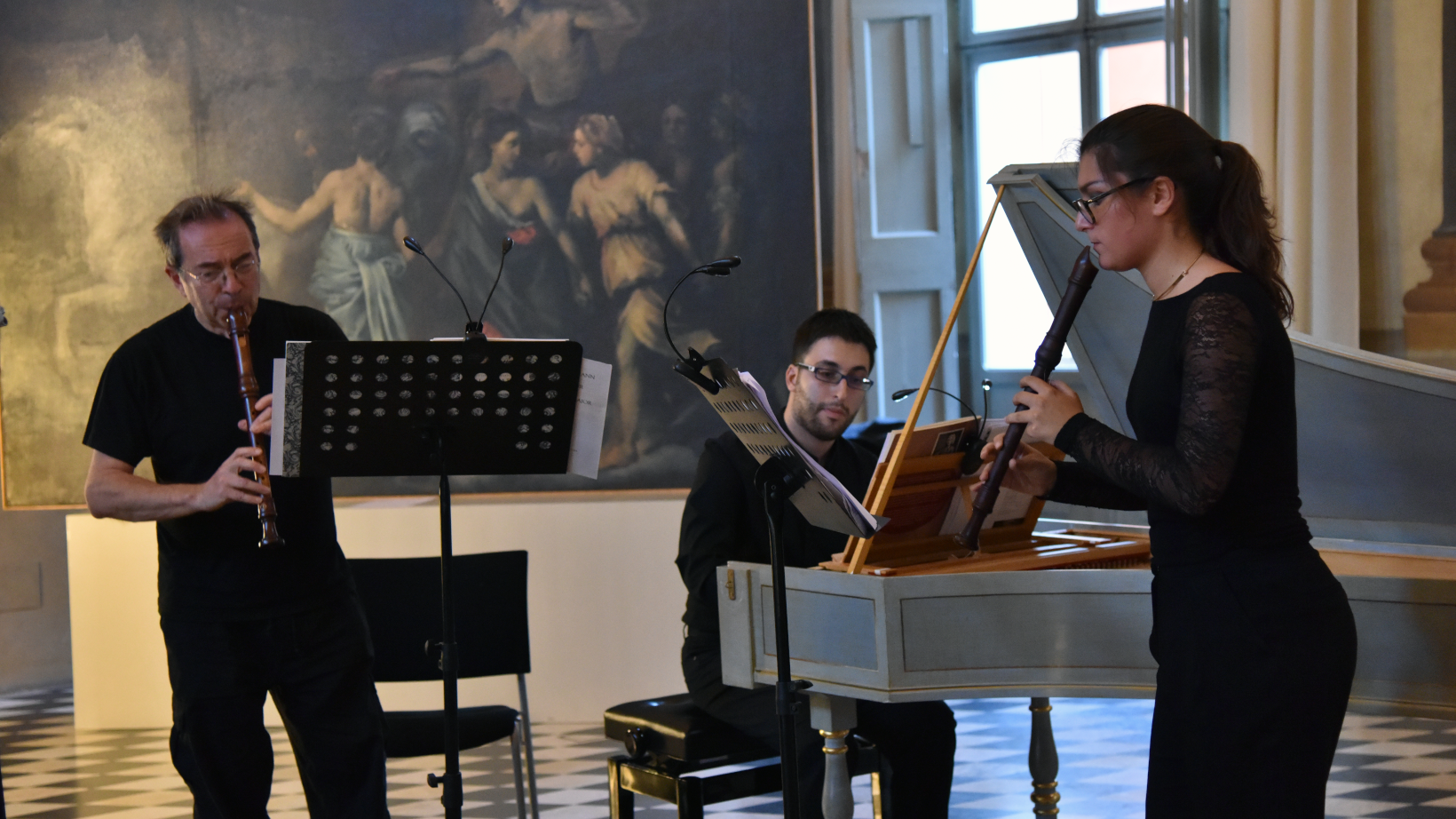 Daniele Salvatore graduated in Flute, Recorder, Composition and as a Choral Conductor (respectively under the guide of F. Di Tommaso, G. Pacchioni, A. Samorì and T. Gotti). He specialised with S. Gazzelloni, M. Ancillotti, G. Manzoni, E. Morricone, A. Persichilli, A. Nicolet, F. Donatoni, F. Bruggen, S. Sciarrino, L. Berio, A. Corghi e D. De La Motte.
Daniele Salvatore graduated in Flute, Recorder, Composition and as a Choral Conductor (respectively under the guide of F. Di Tommaso, G. Pacchioni, A. Samorì and T. Gotti). He specialised with S. Gazzelloni, M. Ancillotti, G. Manzoni, E. Morricone, A. Persichilli, A. Nicolet, F. Donatoni, F. Bruggen, S. Sciarrino, L. Berio, A. Corghi e D. De La Motte.
He won numerous prizes both as composer and as recorder player.
In particular he won, in 1984 at the "Concorso Carrara", two prizes to be published with Alzo gli occhi verso i monti (for choir) and Largo mistico (for organ).
In 1985 he won the third prize at the "I Concorso Nazionale di Composizione Camillo Milano of Genova" with Ropagames for piano solo.
In 1993 he won the third prize at the "Concorso Internazionale di Composizione of Rassegna Corale di Loreto" with a Latin Mass Missa Reservata. In 1997 he was invited to direct his own work Missa Reservata broadcasted live on Rai 1 (Italian Radiotelevision). The Mass was performed by twelve choirs, from all the world, participants of "37th Rassegna Corale di Loreto".
In 2002 he was the only Italian composer to win an important recognition during the competition "Waging Peace Through Singing" organised by an important American institution. At this competition took part composers from thirty different countries and his composition for choir One, Two, Three, Four has been chosen among the others.
In 2003 he won the second prize at the "Concorso Internazionale di Composizione per ensemble di Ocarine A. Barattoni”, of Budrio with the composition E drägh dal sett test for seven ocarinas.
He performed in Italy, Ireland, Egypt, Poland and Belgium and his works have been performed in Italy, Australia, Uruguay, Chile, Argentina, Brazil, Colombia, Mexico, Spain, Belgium, Germany, Luxembourg, Poland, Lebanon, San Marino, Yemen, Turkey and Greece.
In 2001 he has been invited to perform his compositions at the festival Lutoslawsky of Stettino (Poland).
In 2004 he has been invited at the Festival of contemporary music of Barcellona (Spain) "Del acuerdo y el conflicto".
In Italy his works have been performed in vaious important Festival and for Concert Associations: "Sagra Malatestiana-Notti Malatestiane", "Notturni in Villa" a Milano, "A.M.A. Calabria", "Santarcangelo dei Teatri", "Fondazione Concerti Niccolò Piccini”, "Ente Concerti-Pesaro", "Amici dell’Arte-Faenza", "Estate Musicale Frentana", "Agimus", "Ass. Filarmonica Umbra", "RAI-Nuova musica italiana", "Gorizia Classica", "Festival delle Nazioni-Città di Castello", "Festival della Valle d'Itria". He recorded several compositions on Cd: Shamrock e Passacaglia della carne e dello spirito performed by Quartetto Chitarristico Italiano (in Works for guitars Quartett…on music today, Rainbow Classica); Helin, for sax and piano, performed by Mario Marzi and Paolo Zannini, with Arnoldo Foà as acting voice (in Saxophone Colours – L’arte del funambolo, Stradivarius); Conchiglia Strombo, for “shells” ensemble, recorded by Nijen Antonio Coatti (in Shellvibes, Alma Musica Harpo). Helin is an important piece too, studied and played in several European and extraeuropean countries. Lately it performed at the Radio ABC (Australia) by Nicholas Russoniello.
He recorded several compositions on Cd: Shamrock e Passacaglia della carne e dello spirito performed by Quartetto Chitarristico Italiano (in Works for guitars Quartett…on music today, Rainbow Classica); Helin, for sax and piano, performed by Mario Marzi and Paolo Zannini, with Arnoldo Foà as acting voice (in Saxophone Colours – L’arte del funambolo, Stradivarius); Conchiglia Strombo, for “shells” ensemble, recorded by Nijen Antonio Coatti (in Shellvibes, Alma Musica Harpo). Helin is an important piece too, studied and played in several European and extraeuropean countries. Lately it performed at the Radio ABC (Australia) by Nicholas Russoniello.
His pieces are archived in the Bibliotheque Internationale de musique contemporaine in Paris and an autograph is archived in The International Music Museum in London.
He published several compositions in Italy and abroad for several publishers: "Edipan – Roma", "Alain Van Kerchoven Editeur – Bruxelles", "Ut Orpheus – Bologna", "Gruppo Editoriale Eridania – Savignano sul Rubicone (FC)", "Pizzicato Verlag Helvetia – Adliswil", "Carrara – Bergamo", "Da Vinci Publishing – Tokio". He also published the didactic work for flute Scale e arpeggi per flauto traverso (two volumes) with "Ut Orpheus" editions, and a new book of scales and studies for alto recorder: La scuola dell'uguaglianza with the "Gruppo Editoriale Eridania".
For several years he has alternated the job as composer-concert artist with that one of researcher-musicologist. The fruits of his work are: Partitura del primo libro de canzoni francese a 4 & alcune Suonate and the Ricercari, both by Nicolò Corradini and the collection Musica by Giovanni Cavaccio edited by "Ut Orpheus" and L’Arte opportuna al sonar di flauto, revision and commentary of the Opera Intitulata Fontegara by Silvestro Ganassi with the "Gruppo Editoriale Eridania". The latest effort is the volume Il Méthode pour apprendre à jouer de la flûte douce by Étienne Loulié, translation of a method for recorder (the first of its kind in France to deal exclusively with the recorder) written in two versions by Étienne Loulié, a Parisian musician from the second half of the 17th century, printed by "Aracne publishing" (Rome 2020). A ponderous study of the history of recorder music in the 16th and 17th centuries is also in preparation.
As recorder player he recorded the first world execution of Partitura del primo libro de canzoni francese a 4 & alcune Suonate by N. Corradini (Aulòs Consort, Tactus 1997) and Gnich Gnach e altri balli strumentali italiani del Seicento by Anonymous of the XVII century (Aulòs Consort, VideoRadio 1997). And with the group Charivari Ensemble he recorded Delle virtute et arte del danzare (Harpo), Il riposo dell’amore (E Records) and O miei amanti (M. A. P. 2013). . With Cappella Musicale di San Giacomo in Bologna he recorded Oratori – Mottetti - Lamentazioni by I. Ghezzi (Tactus – Bologna 2015), Il Seicento Italiano «alla Spagnuola» by A. Falconieri and F. Coppola (Tactus – Bologna 2016), Ippolito Ghezzi Oratori - Mottetti – Lamentazioni (Tactus - Bologna, 2015), Divi Augusti Musici (Novantiqua – Roma, 2021), Baruffe amorose del Settecento (Tactus – Bologna, 2021). With Armonia delle sfere he recorded Flute Quartets op. 23 by G. Paisiello (Da Vinci Classics – Japan, 2014) and the first world recording of Produzioni Armoniche by Antonia Bembo (with Gloria Banditelli and Miho Kamiya). In 2020 he published the double CD XII solos for recorder/flute and BC by Francesco Mancini ("disco 5 stelle" of November 2020 in the magazine MUSICA). Furthermore, a triple CD containing Girolamo Fresobaldi's Arie Musicali is in preparation (with Gloria Banditelli, Santina Tomasello and Miho Kamiya). In 2017 he recorded Messe di Cortellini (Tactus) and in 2020 he recorded a second CD for Tactus: Giovanni Battista Martini – Azione Teatrale 1726, both with the choir Euridice and the instrumental ensemble Ensemble di Strumenti Antichi Circe, conductor: Pier Paolo Scattolin. At the present time he is playing with Armonia delle sfere (music from seventeenth and eighteenth centuries) and Charivari Ensemble (medieval and Renaissance music) but he cooperated with several Baroque orchestras and worked with performers such as D. Fasolis, A. De Marchi, R. Gini, E. Velardi, M. Longhini, F. Amendola, D. C. Colonna, C. Gasdia. As part of the concert activities of the Bologna Conservatory, he directed the execution of Membra Jesu nostri, by D. Buxtehude, Te Deum, by M. A. Charpentier and The Fairy Queen, by H. Purcell and has performed with various colleagues including Enrico Gatti and Bettina Hoffmann.
At the present time he is playing with Armonia delle sfere (music from seventeenth and eighteenth centuries) and Charivari Ensemble (medieval and Renaissance music) but he cooperated with several Baroque orchestras and worked with performers such as D. Fasolis, A. De Marchi, R. Gini, E. Velardi, M. Longhini, F. Amendola, D. C. Colonna, C. Gasdia. As part of the concert activities of the Bologna Conservatory, he directed the execution of Membra Jesu nostri, by D. Buxtehude, Te Deum, by M. A. Charpentier and The Fairy Queen, by H. Purcell and has performed with various colleagues including Enrico Gatti and Bettina Hoffmann.
A special collaboration is that with Collezione Tagliavini, the famous instrumental collection by organist Luigi Ferdinando Tagliavini. Beyond playing like concert performer, Daniele plays the Flageolet (“Flautino alla francese”, XVII century ) in ivory, part of Collection.
Daniele has taught composition and recorder in various Italian conservatories. Winner of a state competitive examination, at present he is a permanent teacher of recorder and historical counterpoint at the Bologna’s Conservatory.
Some of his best students are Carlo Pari, an excellent pianist, who graduated in composition under his guide and Giovanni Allevi, one of the best-ever pupils.
Daniele Salvatore has graduated students of flute, recorder and composition, a little record!


